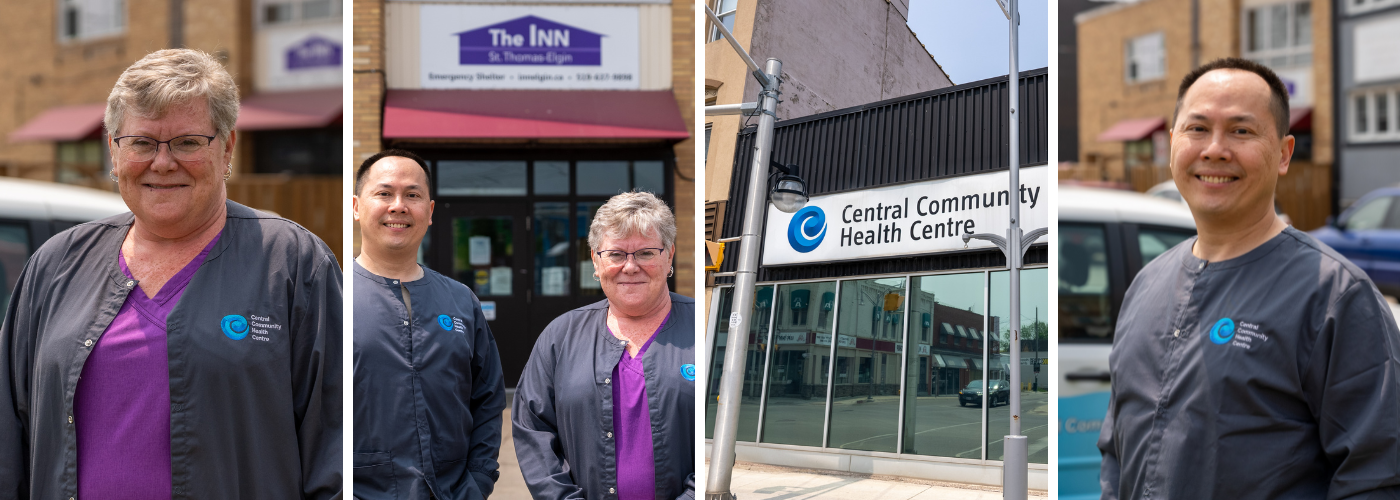Partner Spotlight - Central Community Health Centre
Partner spotlight: Central Community Health Centre Team is helping people move toward better health
“It’s important to recognize that people use opioids to deal with their past and present traumas as well as a coping mechanism for when they’re stressed. But despite the fact that each person has a different relationship with opioids, each can be helped.”
For the past two years, Dr. Joseph Mai and Registered Practical Nurse (RPN) Shelley West have provided treatment for opioid addiction to vulnerable and homeless patients in St. Thomas through the Central Community Health Centre’s (CCHC) Primary Care Outreach Clinic. Each week at INN Out of the Cold, they help people suffering from addiction to break the cycle while providing a safe space that embodies acceptance, understanding, and freedom from judgment.

Dr. Mai and Shelley agree that the historical responses to the opioid crisis have been ineffective and it’s time to focus on an individual’s needs rather than their failings. Furthermore, they stress that barriers to wellness, such as housing and mental health, must be addressed as part of the treatment for addiction. “It’s hard to treat patients unless they have a place to stay, and we see that treatment is most successful when patients have security and they are also receiving mental health care,” they say. Addiction is complex and there needs to be a strong foundation supporting each person wanting to move forward with their health.
Recent research has shown that Buprenorphine, available as an ingestible medication known as Suboxone or an injectable known as Sublocade, is an effective treatment for Opioid Use Disorder (OUD). Sublocade works by eliminating cravings and withdrawal effects and each dose is effective for 30 days. It allows patients to participate in their daily lives without having the interruption of a doctor’s appointment or pharmacy visit daily or weekly. As with other OUDs, “eliminating withdrawal and cravings helps with improved mental health and family relations,” Dr. Mai says, “The problem isn’t that we don’t have a treatment, it’s that some treatments like this aren’t well accepted.” The program offered through CCHC doesn’t require complete abstinence from substance use. That’s because the team understands there is often a psychological dependency on substances to mitigate previous traumas.
There is a lot of misinformation circulating that leads to many forgoing the treatment available to them. That is something both Dr. Mai and Shelley are hoping to disband. “A lot of patients come to us through word of mouth, and we first talk to them about how Sublocade works. We chat through their worries and anxieties and the negative stories they’ve heard,” says West. The program does not turn anyone away and they put an emphasis on completing the injection quickly as there is a risk of the patient not returning if there’s a delay in administration.
“These are people who may have been put on pain killers twenty years ago for chronic injuries, who come back a week after their first injection and tell us they went from rock bottom to being able to do things like walk their dog and maintain relationships with their friends and family.” This is the result of the Sublocade which remains constant in their systems throughout the month and helps to reduce cravings. The lack of awareness about treatment options like Sublocade, and the perpetuation of stigmas surrounding substance use will continue to hold people back from better health unless we have new conversations from a different lens.
Dr. Mai and Shelley are only at INN Out of the Cold one afternoon a week, but they make themselves available by phone or in person throughout the week to both current and potential patients…”If they wake up at 2 p.m. in the afternoon and can’t find someone available to administer Sublocade, that’s an issue in their treatment journey, so, they can send us a message and plan for when they can come see us. We are very diligent about seeing them and building trust [that the care will be there for them],” says West.
Dr. Mai and Shelley have not lost a patient of this program in the two years they’ve been offering it.
The message they both want to convey is that people experiencing addictions have a chance at reentering society and getting their lives back. “We have had patients who had businesses years ago who have restarted them,” says Dr. Mai, “We need to understand that we all play a part in how our society functions, and if we want a better society, we need to take the steps to help those around us.” There is hope, there is help, and there is space for understanding and empathy. However, there needs to be a more multifaceted approach that focuses not only on addiction but also mental health care and housing as these issues are all so intricately weaved together.
Contact Us
Southwestern Public Health (8:30 a.m. - 4:30 p.m., Monday - Friday)
St. Thomas Site
(Administrative office)
1230 Talbot Street
St. Thomas, ON N5P 1G9
Woodstock Site
410 Buller Street
Woodstock, ON N4S 4N2
Call us toll free: 1-800-922-0096
Email us
Work with Us
Southwestern Public Health (SWPH) values our people! We pride ourselves on our positive and flexible work environment.
